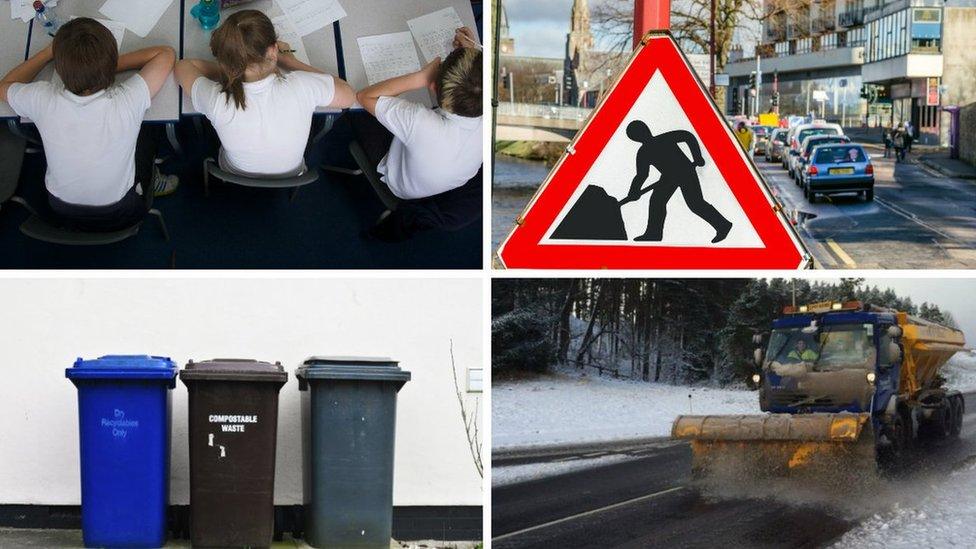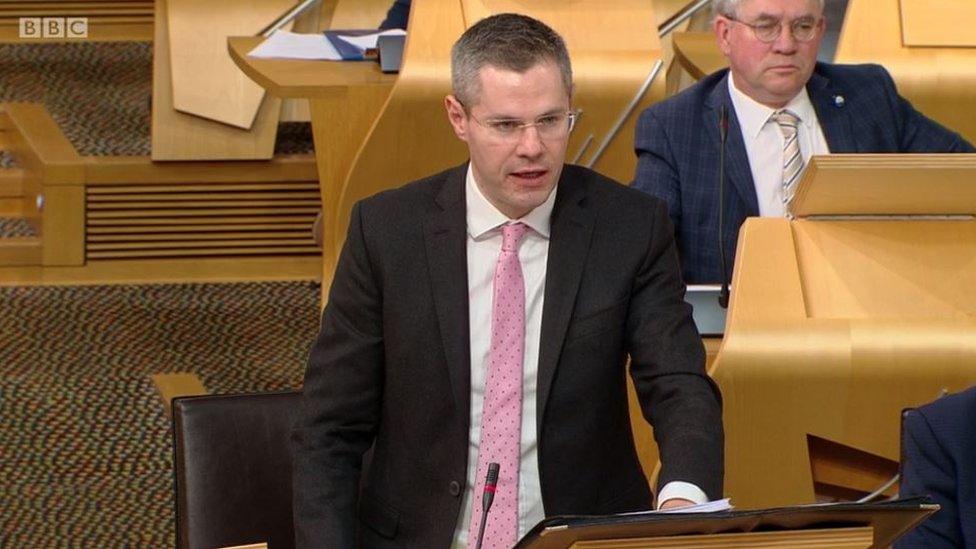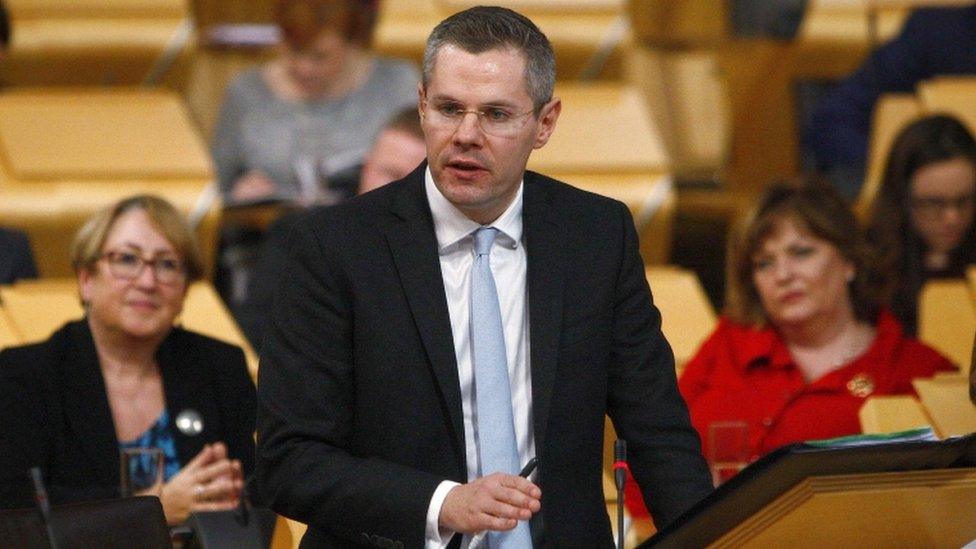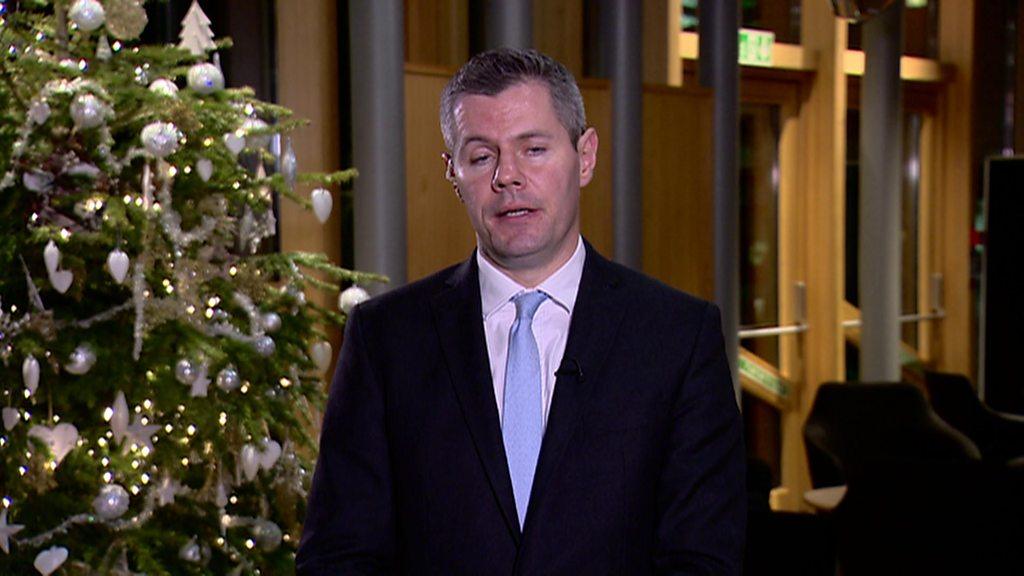Glasgow and Fife councils predict cuts after budget
- Published

Two of Scotland's biggest councils have warned they expect to make savings or cuts of up to £90m between them.
Labour-run Glasgow City Council said it may need to make £60m of savings while Fife, also controlled by Labour, forecast £30m.
Finance Secretary Derek Mackay said he was investing an extra £240m in local services when he unveiled his draft budget on Thursday.
The figure is disputed by opponents who claim a £300m funding drop.
The draft budget document showed the amount of money local government will receive from Holyrood dropping from just under £10.1bn this year to slightly less than £9.65bn in real terms in 2017-18.
Closer links
But Mr Mackay insisted that, "in totality", local services would receive additional funding because local authorities were allowed to increase council tax by up to 3%.
Money due to be paid directly to head teachers to close the attainment gap will now be funded from central government, allowing councils to keep money raised by changes to council tax on higher-value properties.
They will also get £357m from the NHS next year to pay for closer links between the health and social care sectors.

Analysis by local government correspondent Jamie McIvor

Councils are of course heavily dependent on the Scottish government for money.
The amount of cash that they receive - the core funding - is coming down when compared with last year. This is the cash that they have flexibility over and can choose to spend as they wish.
However, there is new funding from the government. Most significantly there is £120m going straight to head teachers as well as £107m to ensure people working for the joint boards covering health and social care are paid the living wage.
As well as this government money, there are a couple of extra sources of cash which will be available to councils.
The changes to the council tax will see people in higher-band properties paying more from April. In addition, councils across Scotland will have the power to increase the charge by 3%.
It will be up to individual councils to decide whether or not they want to do this.
This is really about whether you are comparing like with like.
Is it about the money available for local services or is it about the core government funding which makes up such a large proportion of council budgets?
Councils across Scotland will be calculating just how much better or worse off they think they are going to be. Glasgow expects cuts and savings of at least £60m - potentially more - and Fife £30m.
That does not mean they expect £60m or £30m less from the government overall. This may mean making savings in one area to balance out meeting rising costs somewhere else.

But some local authority leaders said the drop in core local government funding amounted to continued austerity.
Glasgow City Council leader Frank McAveety told BBC Radio's Good Morning Scotland programme that the decision to raise the council tax rate for higher-value properties would ultimately benefit more affluent local authorities, but not Glasgow.
He added: "We're talking about a reduction of £60-£70m this year, even with the 3% [council tax rise]. So we're talking about the maximum raising from that of about £6m, so there's a massive gulf.
"The idea that that compensates for the cumulative impact on Glasgow over the years is just kidding on."
'Every penny'
He added: "The truth of the matter is that local government services will have less money this year again and that's an ongoing thing for Glasgow and the minister should be ashamed of himself."
The co-leader of SNP-controlled Aberdeenshire Council, Richard Thomson admitted that the local authority would have less money over the next financial year.
However, he told the programme: "Yes, we will have less money but certainly not of the magnitude that's bring talked about in Glasgow and Fife. The early indications are that we had a settlement of just over £400m last year and we're expecting it to be slightly under this year, so we're not talking about a huge difference.

Derek Mackay insisted the "totality" of funding for public services would increase
"A very large part of the smallness of the difference in Aberdeenshire across the two years is about the ability to retain every penny that's available through the increase in council tax on houses banded E to H.
"That's a very significant portion for Aberdeenshire, it's about just over £8m."
The leader of Fife Council, David Ross said: "No matter how Derek Mackay tries to dress it up, this is a significant cut in the core funding to councils across Scotland that will have a real impact on local services.
"We won't know the detail of exactly how the settlement will affect Fife until next week, but my initial view is that we will still be forced to make over £30m cuts to services in Fife.
'More revenue'
Mr Mackay insisted that "the totality" of funds available for local services would increase as a result of his budget.
He claimed that if it had been so unpopular, his budget would have been rejected by the local government umbrella body Cosla.
He said: "You have to look at the whole package to local government. If this settlement was so bad tell me why Cosla hasn't rejected the package that I've presented to local government?
"They're considering the package and they certainly haven't rejected it because they recognise that there's been movement in areas of policy."
Mr Mackay also rejected criticism of the decision not to introduce a 50p level of tax for top earners - a policy included in the SNP's 2015 manifesto.
He did, however, decide not to pass on a cut in income tax for people earning £45,000 a year to £43,430, that will be given to people elsewhere in the UK.
He said: "We'll keep it under review, but we won't raise it in such a way that it could lose income in tax receipts to Scotland.
"If we believe it will raise more revenue in Scotland then we will look at that, but if it looks as if it would lose us money to invest in public services then it's not an increase worth making."
- Published15 December 2016

- Published15 December 2016

- Published12 December 2016
